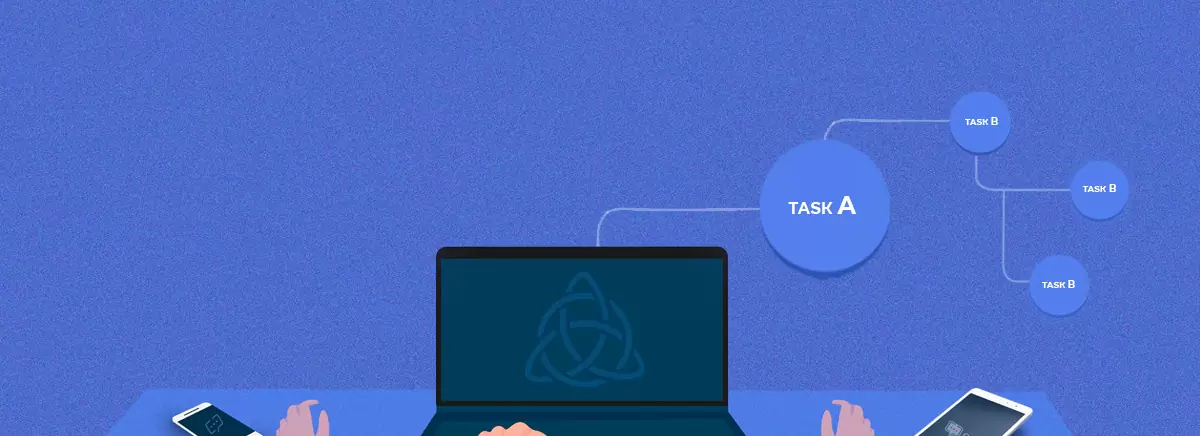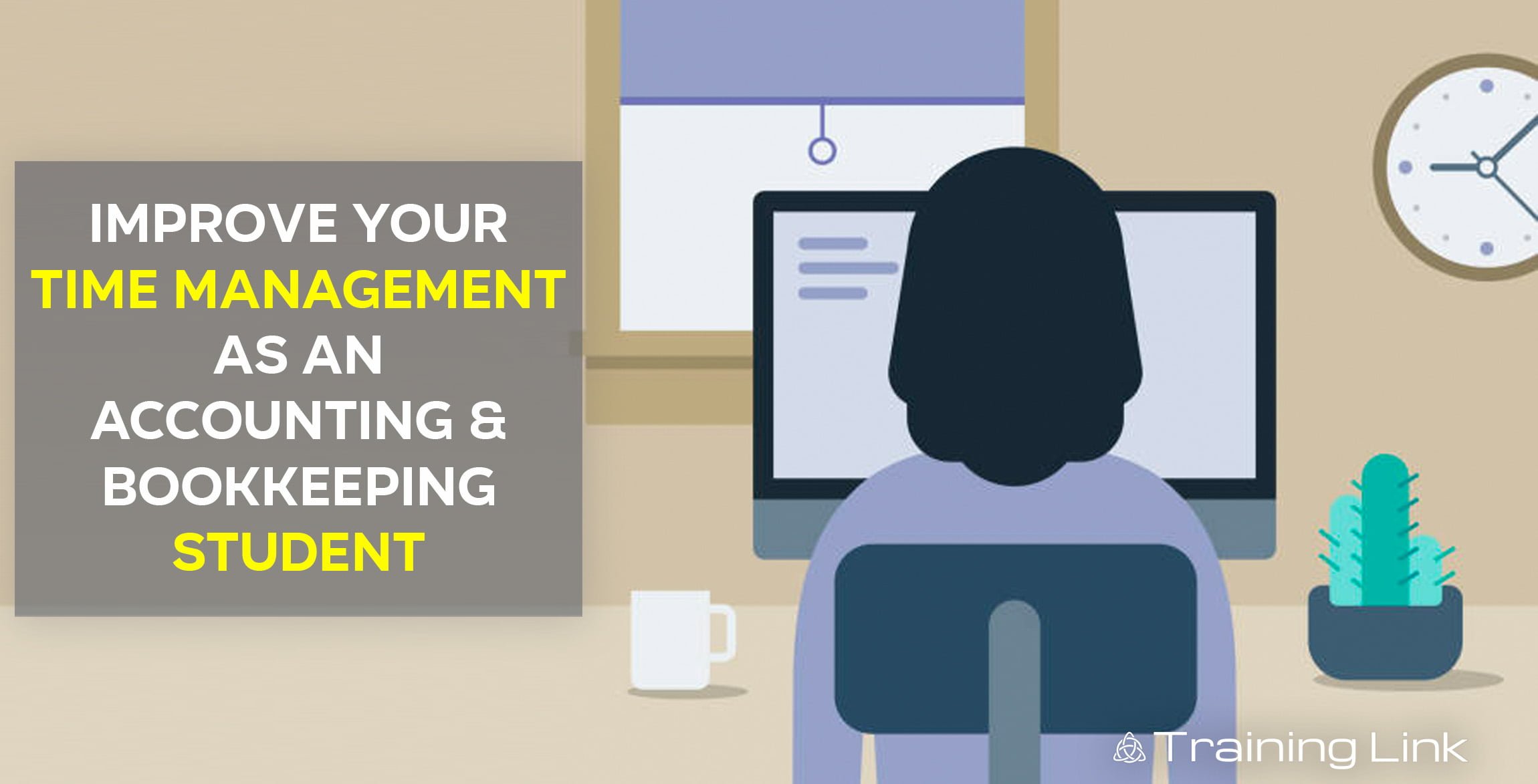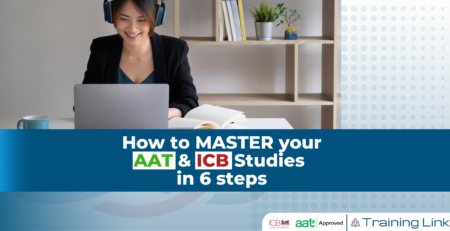Improve your Time Management as an Accounting & Bookkeeping Student
Whether you are in the midst of studying to complete coursework or working in preparation for examinations; time management will be key to your success.
Students often find that one of the most challenging aspects of studying accounting is managing their time effectively. With a wide range of topics to cover and numerous deadlines to meet, it can be easy to feel overwhelmed.
However, there are some simple strategies that can make a big difference when it comes to time management. Accounting is a busy industry, and those who are able to manage their time effectively will be well-positioned for success in their careers. By perfecting your time management skills now, you set yourself up for a bright future.

1. Don’t be afraid to say no
With books to read, formulas to practice, extracurricular activities, and a social life to maintain, it can be difficult to find a balance. We all wish at times there were more hours in the day, but in reality, we have to choose where we spend our time.
Saying no to friends and family can be very hard, especially when you are integral to their daily routine. But it is important to set aside time to study. Saying no to commitments that may result in overwhelming your schedule, can help prevent stress during your studies. Being overstretched means you aren’t relaxed and working at a pace you have set. This usually results in you rushing, which makes retaining information more difficult. Learning to say no is an important part of time management. It allows you to focus on your studies and develop as an individual.

2. Control your work environment
Students often find difficulty, staying focussed in a cluttered workspace. A focused mind gets more done and is more efficient. Cleaning your desk, organising your paperwork, and removing distractions such as mobile phones, helps set you up for a good work session.
Not only is your desk organisation important, but your computer set up too. Clearing clutter from your computer desktop means when you begin work, your start with a clear mind. Try to allocate 5 minutes after each study session to tidy up and organise. This can also be a time for reflection on what you have studied during the day. Setting aside time to make notes and clear your workstation, means the next time you study; you come to a clean area and start with a fresh mind.

3. Write down using Pen + Paper
When it comes to accounting, computerised systems have countless benefits which outweigh traditional forms of accounting with pen and paper. From the speed of use, accuracy, reliability and automation; using a computer to solve accounting problems is far more beneficial. However, when it comes to studying it is a different story. Students often find that they learn better when they take the time to write out information by hand. Especially when studying accounting and bookkeeping, students need to be able to digest large amounts of information and remember key points. When you hand-write information, you are forced to slow down and process the material in a different way. This can help you better understand and store the information.
Additionally, writing out cue cards can be a great way to organize your thoughts and review key points more effectively. By taking the time to write out information as you study, you will save time when it comes to revising for exams and assessments. You can give yourself a significant advantage in terms of learning and time management, whilst being more efficient.
Overall, students who take the time to use pen and paper when studying often find that they reap greater benefits in terms of their time management and comprehension skills.

4. Organise your calendar
An effective calendar can be a powerful tool in helping students to stay on track and make the most of their time. By planning ahead, you can avoid last-minute scrambling to finish assignments or prepare for exams. This can help relax your mind and absorb information better.
In addition, you will be able to plan time to revise and revisit topics that you may have missed the first time around. A calendar can also help balance work and life commitments. Knowing when you need to study, can help you plan for holidays or breaks in your schedule. When used effectively, a calendar can help you strike the perfect balance between work and play, ensuring that they make the most of their time – both in and out of studies.

5. Visualise the Marathon Not Sprint
As an accounting student, you may find that studies come easily to you and you zip through the work with little effort. Or, you may struggle to get into the flow of things and find the work more challenging than you expected.
Either way, it’s important to remember that studying for accounting and bookkeeping is a marathon, not a sprint. If you find the work easy, don’t get complacent or burnt-out – there’s a lot of material to cover. And if you’re struggling, don’t despair – break the work down into smaller chunks and experiment with different ways of learning until you find a method that works for you. The most important thing is to remember that accounting takes time and there’s no need to rush. You’ll get the best results if you work at your own pace and stay motivated throughout the course.

6. Prioritise your tasks
One way to stay on top of things in life, is to use a checklist. Marking off tasks as they’re completed, is a great way to track your journey. This visual representation of your progress can be very satisfying, and it also helps you see at a glance what still needs to be done. It’s important to know how to prioritise though. Having an overview of what you need to do complete, and how long it will take is a huge factor when it comes to prioritising.
For topics that are more in-depth, try breaking these into smaller pieces to study. By doing this, they become less daunting and easier to digest. There are many ways to organise your tasks using a computer or your mobile phone. There are free applications such as Notion, Quire, Evernote and Google Keep.
A personal favourite of many is a traditional whiteboard. These come in all forms and sizes and are great for writing down tasks for the day and having a visual task board to work through daily.

7. Follow the 1:3 Task Rule
Any accounting student will tell you that one of the most important things for success in the field is consistency. The best way to stay consistent is to follow the 1:3 rule. This means that for every 1 big task you complete, you then begin working on three smaller ones.
For example, if you’re studying for an accounting exam, your big task might be to read the a few chapters in the textbook. Your following three smaller tasks could be; to write notes on cue cards, watch videos from accounting professionals, and practice online accounting problems.
By breaking down your big tasks into smaller ones, you’ll find it easier to stay on track and make progress. Plus, you’ll feel more accomplished when you complete a big task knowing that you’ve also made progress on three smaller ones.

8. Reach out for help
As an accounting or bookkeeping student, you may feel like you hit a brick wall when studying. This is normal!
Sometimes we rely on google to have the answers for us, but in accounting and bookkeeping, not all the answers are applicable to what you are studying. That’s why reaching out for help is so important. Reaching out is not a sign of weakness, but rather a strength. It shows that you are willing to learn more and that you understand tutors and teachers are here for you to better understand the material.
You also build relationships with tutors, which can be helpful both now and in the future. At Training Link, we assign you a tutor who is dedicated to helping you pass your accounting or bookkeeping course. Tutors want you to succeed and are waiting for you to use them as a resource. So don’t be afraid to reach out when you hit a brick wall – it’s the best way to learn!
Tutors aren’t your only avenue to to get help. Joining an accounting student community can have many benefits, even if you are not currently studying accounting. Student Street is a community set up for all accounting students, ex-students and practising accountants. Being part of this community can help build your confidence as you connect with other accounting professionals.

9. Rest
Rest is fundamental when it comes to not only studying but to your general health and wellbeing. Staying rested helps you study better; you can take in more information, have better focus and be more productive.
Making sure you have a good night’s sleep is easier said than done! However, with families and so many distractions, it is hard to always switch off.
There are times when we hit brick walls. We have all had moments where we have tried to study, and our minds aren’t cooperating with us.
Just taking small breaks, and then coming back to work can perform wonders – you tend to take in information better with a fresh mind. We are all different; learning how much you can learn at once is key. Don’t push yourself too hard & stay conscious of how you feel.
Conclusion
Today we have covered nine different methods which, if put into practice and tailored to your individual needs, should help you improve your time management skills. Accounting and bookkeeping can be difficult subjects to study but with the right attitude and a plan in place, success is achievable. We hope that this blog post has been of some use to you.
We have many resources available to help you succeed. Always remember, don’t be afraid to ask for help when needed.
Good luck with your studies!












